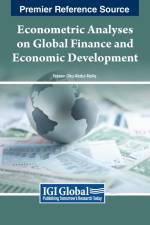von Yekeen Oku Abdul-Maliq
313,00 €
Understanding the complex interplay between economic ideologies, political systems, and international relations is more critical than ever. The legacy of the Cold War still lingers, shaping the global stage in myriad ways. The ideological divide between capitalism and communism, democracy and authoritarianism, has left a lasting mark on our political and economic landscapes. However, as the world continues to evolve, traditional definitions and assumptions about these ideologies have begun to blur, creating a pressing need for fresh perspectives. The book, Econometric Analyses on Global Finance and Economic Development, serves as a beacon of knowledge for scholars, students, and policymakers seeking a deeper understanding of economic history, political economy, and international relations. By meticulously analyzing fifteen countries, the book unveils a remarkable transformation in economic ideologies and their impact on prosperity. From the post-Cold War era to the present day, it provides empirical evidence of how these shifts have led to more resilient and buoyant economies. Targeted towards those interested in the intersection of history, economics, and politics, this book presents an extensive analysis of countries such as China, India, Vietnam, and many others, shedding light on their economic transformations and their path to global prosperity. Whether you are a student, a researcher, or a decision-maker in the fields of economics, international relations, or development finance, this book offers valuable insights into the dynamic forces shaping our world.

